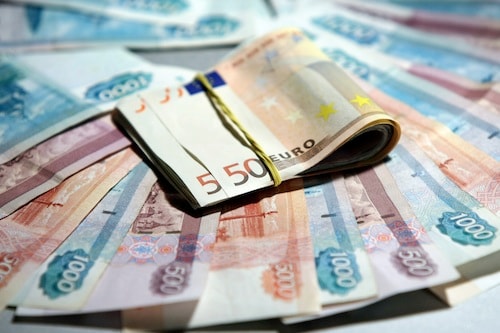Challenges for Russia as the Ruble depreciates
(Baonghean.vn) - The continuous devaluation of the ruble in recent days and the risk of recession in the Russian economy are direct consequences of the sharp drop in oil prices as well as the financial sanctions imposed by the West on Russia. Many analysts around the world warn that the devaluation of the Russian currency is not only posing a major challenge to President Putin's policies.
(Baonghean.vn) - The continuous devaluation of the ruble in recent days and the risk of recession in the Russian economy are direct consequences of the sharp drop in oil prices as well as the financial sanctions imposed by the West on Russia. Many analysts around the world warn that the devaluation of the Russian currency is not only posing a major challenge to President Putin's policies.
It can be said that in recent days, the Russian ruble has fallen to its lowest level against the euro since the European common currency was born in 1999. The Russian currency has fallen to 54 rubles to 1 euro after a continuous decline compared to most other major currencies. The reason for the ruble's strongest impact since 2008 is firstly due to the impact of Western sanctions on Russia related to the war in Ukraine and secondly due to the sharp drop in oil prices after the Organization of the Petroleum Exporting Countries (OPEC) refused to cut production last week.
| RELATED NEWS |
|---|
 |
| The Ruble is losing value. |
Now, after only a few days of decline, inflation in Russia has increased. The food import embargo has caused Russia's September consumer price index (CPI) to rise to 8%. Food prices are also skyrocketing. The devaluation of the Ruble has also made the USD debts of businesses and banks heavier. The struggling businesses have also affected the Russian economy. The negative developments in Russia have caused Moody's to cut Russia's investment credit rating to second from the bottom.
The impact of the ruble's devaluation on Russia is something that everyone can predict, however, the issue that the public is concerned about now is not why the ruble has fallen so sharply, but the question is whether this currency will continue to fall and how it will affect the economic situation in and outside Russia in the coming time. Such issues are completely justified when there are many not very optimistic comments about the ruble's prospects. According to Bloomberg, the ruble will still be among the top losers in the world, just behind the Argentine peso. And, it is predicted that this currency can continue to fall even deeper, despite the intervention efforts of the Central Bank of Russia. In fact, it can be seen that the ruble's devaluation still seems to be worrying when, on the one hand, Russia has spent tens of billions of dollars in foreign exchange reserves and is continuing its foreign currency sales campaign to curb the decline of the domestic currency, but the fall in oil prices along with investors' concerns about Russia's not-so-bright future when the US and EU impose a series of sanctions... have made the Kremlin's efforts ineffective.
It is clear that the financial sanctions of the West and the continuous decline in oil prices are having a negative impact on the Russian economy. A country with about 2/3 of its export turnover coming from oil and gas is of course affected by a significant impact. Russian Finance Minister Anton Siluanov predicted that the financial sanctions of the West will only cause about 40 billion USD/year in damage to the Russian economy, but the damage from the decline in oil prices to Moscow could be up to 90 to 100 billion USD/year. The head of the Russian financial sector is concerned that if the oil price falls to 60 USD/barrel and the West tightens sanctions, the domestic economy could fall into recession in 2015.
The economic damage to Russia is clear. But what is of concern now is that the rapid depreciation of the ruble could become a political obstacle for President Putin, who still enjoys strong support from the Russian people, despite his tough policy regarding the Ukraine crisis that has led to heavy economic sanctions from the West. Therefore, how to stabilize the current situation continues to be a challenge for the Kremlin boss./.
Thanh Hien






